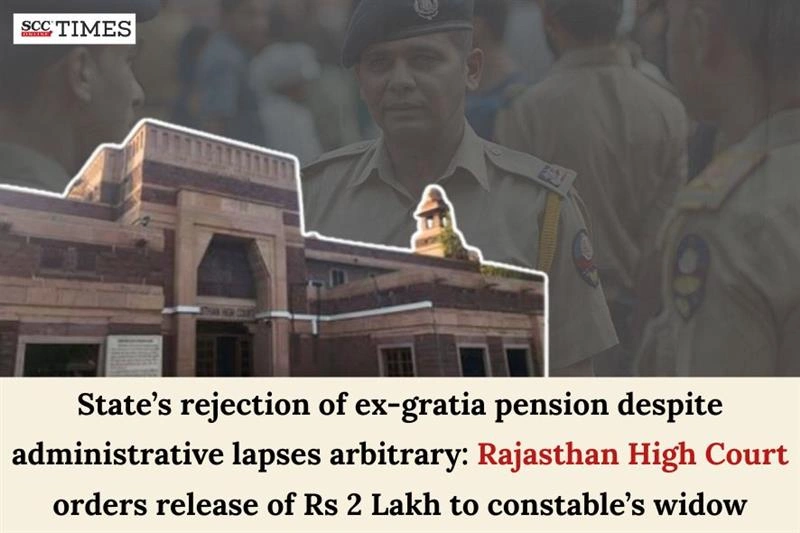Rajasthan High Court: In a writ petition filed by the petitioner, widowed wife of a constable, under Article 226 of the Constitution challenging rejection of her ex-gratia pension claim on grounds of delay in processing the application, a Single Judge Bench of Farjand Ali, J., held that the delay in processing the application was entirely departmental and that the petitioner could not be penalised for circumstances beyond her control. The Court stated that rejection of the petitioner’s claim on the said ground was arbitrary and unsustainable in law and hence, ordered the release of ex gratia, i.e., Rs 2,00,000, payable to her.
Background
In August 1975, petitioner’s husband was appointed as a Constable in the respondent-Department and served with exemplary dedication and integrity. In June 2013, while performing his official duties, he had a fatal accident and passed away. Accordingly, his name was deleted from the police nominal roll in towards the end of the same month.
In August 2013, a family pension was sanctioned to the petitioner, which she continued to receive. Being an illiterate woman from a rural background, she was unaware of her entitlement to ex-gratia benefits under the Rajasthan Civil Services (Pension) Rules, 1996 (‘Rajasthan Pension Rules’). Upon learning about such entitlement, she sought information under the Right to Information Act, 2005, and thereafter in December 2016, submitted an application for ex-gratia pension enclosing all requisite documents. However, no action was taken.
Upon reminders, she was asked to re-submit the application which was done by her in March 2017. In April 2017, the Superintendent of Police (‘Superintendent’) recommended her case to the Financial Adviser, supporting her claim. The Financial Adviser sought clarification regarding the delay, which was duly explained by the Superintendent stating that the delay had occurred due to departmental lapses and not due to any fault of the petitioner.
The matter was then referred to the Home (Group-2) Department for relaxation under Rule 75(4) of the Rajasthan Pension Rules. Repeated recommendations were made in favour of the petitioner, and the District Collector also directed early action. However, the petitioner’s claim was ultimately rejected solely on the grounds of delay. Upon learning of the rejection through an RTI response in 2020, the petitioner approached the High Court.
Analysis and Decision
The Court noted that the death of petitioner’s husband occurred during employment which could not be treated as a natural death and held that the death of petitioner’s husband constituted a service-related death under the ex-gratia scheme contained in Rules 75 and 105 of the Rajasthan Pension Rules.
Further, the Court stated that the record revealed that the petitioner applied for ex-gratia benefits as soon as she became aware of her entitlement and her claim was repeatedly recommended by the competent officers specifying that the delay was due to departmental lapses, therefore, holding the petitioner responsible for the delay was wholly unjustified.
The Court held that the respondents’ decision to reject the claim on technical grounds, despite their own acknowledgment of administrative fault, reflected a hyper-technical and insensitive approach inconsistent with the welfare nature of the ex-gratia scheme. Such conduct defeated the very object of the pensionary provisions, which are intended to provide immediate financial relief to the bereaved family of an employee who dies in service.
Thus, the Court observed that the delay in processing the application was entirely departmental and that the petitioner could not be penalised for circumstances beyond her control. Further, the Court held that rejection of her claim on this ground was arbitrary and unsustainable in law.
The Court, thus, quashed the impugned order rejecting the petitioner’s claim for ex-gratia pension on the grounds of delay. Further, the Court directed the respondents to process and release the ex-gratia amount of Rs 20,00,000 within 60 days payable to her.
Hence, the Court allowed the petition and opined that “In cases of death in the line of duty, the authorities must act with sensitivity and promptness to ensure that bereaved families are not subjected to unnecessary hardship on account of procedural rigidity. Welfare provisions like ex-gratia pension must be implemented in their true spirit and not frustrated by technicalities”.
[Shanti Devi v. State of Rajasthan, 2025 SCC OnLine Raj 5736 decided on 6-11-2025]
Advocates who appeared in this case:
For the Petitioner: Mahaveer Singh
For the Respondent: B.L. Bhati, AAG, Sandeep Soni and Sukhdev Sharma



